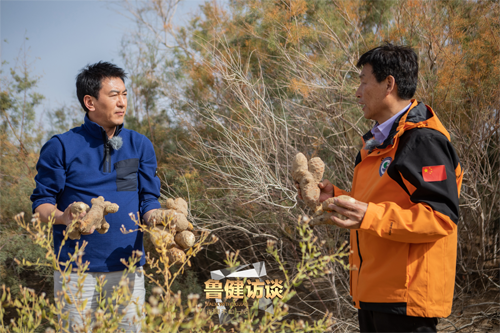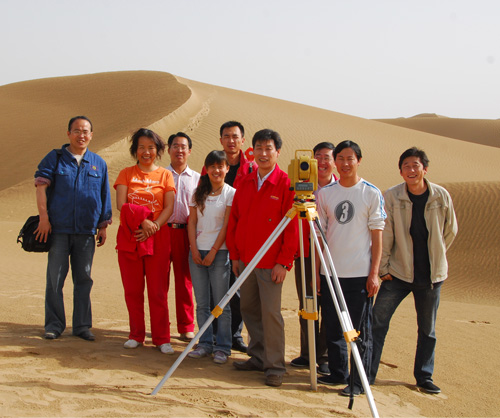In April, he was awarded the National May 1st Labor Medal; in May, he won the National Innovation Pioneer Award; in June, he organized the Third Taklimakan Desert Forum; in July, he joined in the discussion on desertification control in the Hexi Corridor-Taklimakan Desert region… His schedule is pretty tight, but he always stands persistently as a resilient desert plant. He is LEI Jiaqiang, a research fellow at the Xinjiang Institute of Ecology and Geography of the Chinese Academy of Sciences (CAS), who still works hard in his 60s and vows to prevent the expansion of deserts.
In 1982, after graduating from Northwest University, he volunteered to work in the Xinjiang Uygur Autonomous Region. He has worked on the desertification frontline for more than 30 years, leaving his footprints in deserts on both sides of the Tianshan Mountains. Despite the extreme conditions, such as bad weather, strong winds, and scorching heat, he has often led his team to conduct sandstorm monitoring, field surveys, and experiments, developing approaches for desertification control. According to different types of landforms and natural hazards, he has tailored different measures for the prevention and control of desertification and developed technical models for afforestation using saline water in quicksand and without irrigation in sandy soil. Moreover, he completed the engineering design for shelterbelt installation along the Tarim Desert Highway.
"Thank you for your dedication, your research will be valuable for the whole world," said Ibrahim Thiaw, then Deputy Executive Director of the United Nations Environment Programme, when he visited and witnessed the impressive shelterbelt along the Tarim Desert Highway in 2015.
Wind-blown sand hazards have always been a key challenge for economic and social development and ecological conservation in arid areas. In response to the need for desertification prevention and ecological conservation in Xinjiang, Prof. LEI strives to promote the technologies of desertification control. He and his team have undertaken a series of desertification control projects related to railways, highways, oil fields, water conservancy, and others in China.
Over the years, he and his team have also implemented projects and trained several technical personnel for countries along the Belt and Road. In Kazakhstan and Mauritania, they provided appropriate solutions for the ecological protection around the capitals of the two countries. In Libya, they designed the plan for sand hazard control along the Murzuq Desert Highway. Their efforts have benefited 17 countries along the Belt and Road, promoting "Chinese solutions" to the world.
In China and beyond, Prof. LEI has exemplified his role as a scientific pioneer with self-motivated, collaborative, and innovative spirit. Concentrating on desertification control, he has shouldered the responsibility for green development, promoting harmonious coexistence between man and nature and contributing to building a global community of shared future for mankind.
Prof. LEI Jiaqiang was interviewed by China Central Television (Image by Prof. LEI's group)
Prof. LEI Jiaqiang was conducting field investigation in Taklimakan Desert with his team (Image by Prof. LEI's group)








